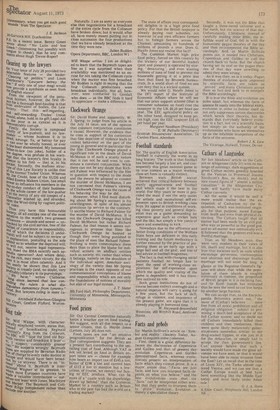Clockwork Orange
Sir: David Hume and, apparently, W. J. Spring, to judge from his article in the July 14 issue, are of the opinion that constant conjunction constitutes a causal. However, the evidence that he cites in support of his contention that film depiction of violence leads to violent behaviour on the part of the young in general and in particular that the film Clockwork Orange played a significant role in the death of David McManus is of such a scanty nature that it can not be said even to constitute a constant conjunction. While there can not be any doubt that Richard Palmer was influenced by the film in question with respect to the mode and the means he adopted to commit the murder of David McManus, I am not convinced that Palmer's viewing of Clockwork Orange was the cause of his behaving the way he did.
However, what I find most disturbing about Mr Spring's account is his unwillingness, in spite of his almost gratuitous lip service to the contrary, to ascribe blame to Richard Palmer for the murder of David McManus. It is not the Clockwork Orange that killed David McManus but rather Richard Palmer; for that reason it seems outrageous to propose that films like Clockwork Orange be banned as though they were being punished in the place of men like Richard Palmer. Nothing is more commonplace these days than to place the blame for individual actions on abstract entities such as society, etc, rather than where. it belongs, namely on the shoulders of the individual agent. Armchair sociology of the variety that Mr Spring practises is the exact opposite of our commonsensical conceptions of blame and responsibility which are not only the foundations of notions of morality but also of our legal system.
J. T. Slater 395 Ford Hall, Philosophy Department, University of Minnesota, Minneapolis, Minnesota


































 Previous page
Previous page